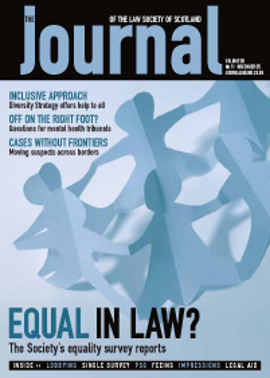Don't fall at the final hurdle

Attention has recently been focused on managing risks at the outset of client work at the engagement stage. The Solicitors (Scotland) (Client Communication) Practice Rules 2005 have been in force since August. The issues addressed by these rules coincide with some of the risk management controls highlighted in previous editions of this column. (See “Get Engaged”, June 2005; “The Big 3”, May 2004; “Marking out the pitch”, December 2003.)
What goes on towards the conclusion of a client matter, and following conclusion, is equally critical from a risk management point of view. This article looks at some of the issues that can be encountered post-completion and the steps that can be taken to minimise the risk of problems occurring.
Post-completion matters can involve a wide variety of tasks, responsibilities and areas of risk, ranging from implementing letters of obligation to advising clients on future actions related to the transaction, such as the exercise of options. Post-completion issues arise in many areas of practice – in commercial property (exercising options, rent reviews and break clauses); in corporate/commercial work (claims under warranties).
Do you issue reminders to the client about post-completion critical dates? Or do you make it clear from the outset that you will not issue reminders? You might be surprised to find that while your own invariable practice is not to issue such reminders, one or more of your colleagues does exactly the opposite. It may be that the same client will get a reminder in one transaction and not in another! It is important that mixed messages are not sent to the client in this way. If the firm’s policy is that reminders are not issued, make that clear from the outset (terms of engagement issue?) and remind the client at completion of the transaction. Conversely, if reminders are to be issued, make that clear from the outset and make sure that the reminder is issued sufficiently in advance of the critical date that the client can take any necessary action prior to giving you instructions. Also make sure that the client is aware that instructions need to be given to you in good time if, for example, an option is to be exercised, so that you have sufficient time to carry out the work.
QUESTIONS TO CONSIDER IN RELATION TO POST-COMPLETION ISSUES
Where does our responsibility to our client cease?
Make sure you are aware of what it is you have been instructed to do. A properly scoped letter of engagement provides the benchmark of service which the client can expect – have you done what was agreed? Without effective communication, the client may well believe that the solicitor’s work and responsibilities go on beyond what is the solicitor’s understanding.
An element of education is called for. Where it is clear that actions require to be taken by the client post-completion, but the actions fall outwith the terms of the current engagement, it makes sense at completion to flag this up to the client, stressing that they should aim to give the firm plenty of notice in respect of anything the client needs the firm to do.
Case study
Clients of the firm had taken an option to purchase development land. The negotiation of the terms of the option had been fraught and protracted but the clients had ultimately been pleased with the eventual outcome. Two years or so later, on his return from the Christmas break, the solicitor concerned discovers that, as well as addressing other matters, a letter from the clients received on Christmas Eve included an instruction to the firm to serve the required notice exercising the option. To be effective, they would have required to serve the notice that day.
When does our responsibility to our client cease?
Be sure that the client is aware of when the firm considers its responsibilities have concluded. This could be as a result of withdrawal from acting, in which case a letter of disengagement may well avoid the client believing that the solicitor is still undertaking certain tasks. Alternatively, the client could be under the misapprehension that the solicitor will remind the client of a certain course of action at some point after the conclusion of the matter in hand.
What is our client’s expectation of us?
Could the client still expect that there is additional work which the solicitor is going to undertake?
Case study
A firm had acted for clients in the acquisition of a small hotel business. This involved the clients acquiring the company which owned and operated two hotels. Less than a month after completion, the clients were in contact with the firm complaining that one of the hotels had been more or less closed down because a licence had not been applied for timeously. They allege that the solicitor handling the transaction should have prompted them to attend to the licence requirements or at least briefed them properly on the ongoing requirements for licence applications.
Have the client’s expectations been managed effectively?
Clients’ expectations need to be managed – either the firm should be advising the client that the matter is at an end and that all further instructions must be initiated by the client, or the firm should be specifically advising that they are taking on an additional responsibility for future work, e.g. reminding the client about the exercise of options etc.
Case study
To the increasing irritation of clients introduced by English solicitors, the process of agreeing the rent review clause in a commercial lease had become a life’s work running to a dozen drafts and endless pages. Eventually, the lease was agreed and signed 18 months after the tenants moved in. Three years on, the clients missed the deadline for initiating a rent review. One of the points the clients made in a confrontational letter to the Scottish solicitors was that their English solicitors always issue reminders about approaching rent reviews and break option deadlines.
Should we be taking on additional/continuing responsibilities for our client?
This is a matter for the firm but it is imperative that a consistent approach is adopted. The firm should have an agreed policy on what post-completion tasks and responsibilities are and are not to be undertaken for clients.
What is the justification for this?
The justification may be that the client has a legitimate expectation that post-completion matters form part of the transaction. It may be that the firm believes it to be an important “added value” service for clients to undertake work post-completion (e.g. reminding clients of upcoming time limits in relation to expiring warranties).
Are we equipped to do this effectively?
The firm must have proper protocols and procedures in place if additional, post-completion responsibilities are to be undertaken for clients. For instance, at a practical level, the physical file may become archived and if there is a zero balance on the client account, the matter may be closed off on the case management system. These actions may all give the impression that no further action is required. If only the fee-earner responsible has discussed with the client any additional reminders that the firm will give, who will be able to action this if the fee-earner leaves?
Case study
A firm acted for clients in the acquisition of a site for development. The missives allowed the clients an option to buy adjacent land at a fixed price. They instructed the firm to exercise the option but, owing to an oversight, the critical date was missed.
If reminders are to be issued, make sure that enough time is given for the client to action these, deliver instructions and for you to take the necessary action.
How does this increase our risk?
If proper systems are in place for attending to post-completion matters, such as reminding clients about the exercise of options, the risks ought to be equivalent to those involved in undertaking any other work for the client. If the firm’s systems are not set up to cope with this (see above), then the risk of an omission is increased.
Does everyone in the firm adopt a consistent approach?
This is critical from a risk management point of view. If different approaches are adopted within the firm, there is an increased risk of oversight or at least client dissatisfaction. Why?
Case study
A firm acted for clients in relation to various public house, restaurant and off-sale licences. The work for the clients was handled principally by C, the corporate partner. C had been increasingly passing the work to F, another corporate partner who tended to get V, an associate in the court team to handle the licensing work. The client’s managing director complained to C that he hadn’t been reminded of an expiring licence, with the result that one of the restaurants had been operating without a licence. C had begun a practice of writing to the clients reminding them in advance of the last lodging dates for the quarterly licensing boards, even though the clients seemed always to be aware of the fact they needed to instruct C. F never undertook such a practice with any client, since it – in his view – meant the risk of oversight was no longer with the client but the firm. The client made a claim on the basis of previous reminders having established the scope of work that the firm was undertaking for them on an ongoing basis.
Charles Sandison was formerly in private practice as a solicitor and is now a consultant to the FinPro (Financial and Professional Risks) Division at Marsh Ltd (e: charles.sandison@marsh.com).
The information contained in this article provides only a general overview of subjects covered, is not intended to be taken as advice regarding any individual situation and should not be relied upon as such. Insureds should consult their insurance and legal advisers regarding specific coverage issues.
Marsh Ltd is authorised and regulated by the Financial Services Authority.
In this issue
- Changing perceptions
- A need undiminished
- Steps forward
- A better way to work
- Combatting the cross-border criminal
- Seen to be fair?
- The lobbying game
- A favoured model?
- A grand day out
- A window of opportunity
- Don't fall at the final hurdle
- Practice guideline: form of accounts and taxation
- Advice for All: the Society's response
- Matter for debate
- Divorcing the divorced
- Uncommon commencement dates
- Scottish Solicitors' Discipline Tribunal
- Website review
- Book reviews
- Still thumbs down
- Search and copy fees changing
- Common currency






